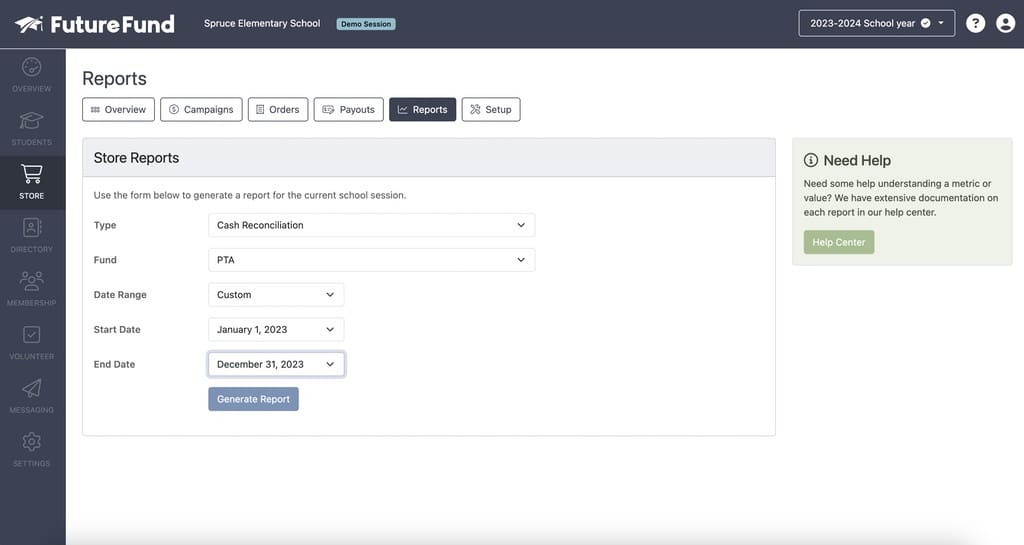
Surviving a PTA Audit: A Guide for Treasurers

Summary:
- PTA audits are usually an annual requirement but can also be triggered by leadership changes, financial discrepancies, or member requests. Being able to anticipate when an audit is coming gives you time to prepare properly.
- Essential financial documents to maintain include bank statements, ledgers, receipts, disbursement forms, budget reports, and more. Keeping these organized is crucial for a smooth audit process.
- During the audit, be prepared to present all necessary documents and attend all scheduled meetings for transparent and effective communication with auditors.
- After the audit, review the findings meticulously, share them with the PTA board, and implement any recommendations for improvement.
- Utilizing platforms like FutureFund can streamline your Treasurer's duties by automatically tracking transactions and generating reports, making future audits smoother.
Surviving a Parent-Teacher Association (PTA) audit doesn't have to be a nerve-wracking experience. If you're a Treasurer who's staring at a looming audit, take a deep breath. An audit is not an interrogation but rather a review to ensure that financial records are accurate and transparent.
FutureFund is full of tools for PTA Treasurers that ensure accuracy and save time when preparing this information, so we've written a guide to help you through the audit process. Read on for a list of actionable steps you can take to navigate future audits with confidence.
Table of Contents
- Pre-Audit Preparations: Proactive Steps to Protect Your PTA
- During the Audit: Ensuring Transparency & Cooperation
- Post-Audit Actions: Maintaining Compliance & Implementing Changes
- Frequently Asked Questions about PTA Audits

Pre-Audit Preparations: Proactive Steps to Protect Your PTA
Here are the first things you should do as soon as you become aware of a PTA audit:
Step 1: Familiarize Yourself with PTA Guidelines
- Read your PTA's bylaws and any other guidelines that relate to financial transactions and reporting.
- Know what financial documents you should be maintaining, including but not limited to: ledgers, bank statements, receipts, disbursement forms, etc.-see our Frequently Asked Questions section at the end of this article for a checklist of documents you'll need.
Step 2: Organize Financial Records
- Categorize your records into appropriate folders-both digital and physical.
- Keep all invoices, receipts, and bank statements in chronological order.
- Maintain an up-to-date ledger for all transactions.

Step 3: Create a Financial Report Summary
- Compile all the financial activities for the period under review into a comprehensive report. FutureFund makes this easier with built-in financial reporting tools that help save time on PTA Treasurer duties.
- Your summary should include an income statement, a balance sheet, and a statement of cash flows.
See Also: What Your PTA Treasurer Report Should Include (& How to Format It)
Step 4: Back-Up All Information
- Save digital copies of all financial records and your financial report.
- Keep backups in multiple places-cloud storage, external hard drives, etc.

During the Audit: Ensuring Transparency & Cooperation
As long as you have your records organized and the information required to place them in context, this should actually be the most straightforward part of the process. Follow these next steps to get through the audit itself smoothly:
Step 5: Present All Necessary Documents
- Make all records available to the auditors as requested.
- Be prepared to provide additional information or clarify any ambiguous entries.
Step 6: Attend All Scheduled Meetings
- Be present in all audit meetings to answer any questions or clarify any uncertainties.
- Cooperate fully but also don't hesitate to ask your own questions about the process.

Post-Audit Actions: Maintaining Compliance & Implementing Changes
Once the audit is completed, you'll still have a few things you need to do. Your post-audit duties include:
Step 7: Review the Audit Report
- Go through the auditors' findings and recommendations meticulously.
- Take note of any discrepancies or irregularities and clarify them with your auditors if necessary.

Step 8: Share the Findings
- Present the audit report to the PTA board, complying with the time frame specified in the bylaws.
- Be prepared to answer questions from the PTA board and provide additional information.
Step 9: Implement Recommendations
- If there are recommendations for improvement, create an action plan to implement them.
- Follow through and periodically review the status of these action items to ensure compliance.
Frequently Asked Questions about PTA Audits
What commonly triggers a PTA audit?
Most PTAs are required to conduct an annual audit as per their bylaws or state regulations. This usually occurs at the end of the fiscal year. However, audits can also be triggered by any of the following:
- When there is a transition of the PTA's key leadership roles (especially the Treasurer)
- If there are noticeable gaps or inconsistencies in the financial records
- If an audit is requested by enough PTA members in accordance with the group's bylaws
- If there is a significant increase in the PTA's budget
- If the PTA is under increased public scrutiny for other reasons
Some PTAs also have provisions for unscheduled audits at any time of year. Studying your PTA's guidelines and bylaws as soon as you become Treasurer will help you know when to expect an audit so you can be prepared.
What documents will I need for a PTA audit?
- Bank Statements: Monthly or quarterly statements from all accounts tied to the PTA.
- Ledgers: Detailed ledgers categorizing incomes and expenditures. Ensure that every transaction can be traced back to a bank statement or receipt.
- Receipts: Keep all original receipts for both income and expenses. Receipts should be filed chronologically and should correspond with ledger entries.
- Disbursement Forms: Forms that indicate authorization for every expense made. These should include details such as who authorized the expenditure, for what purpose, and on what date.
- Deposit Slips: Proof of deposits made to the bank account, which should align with your income ledger.
- Budget Reports: A budget-to-actual report outlining the approved budget for the year and showing the actual income and expenses.
- Cash Box Logs: If cash is handled during events, cash box logs need to be maintained to track all cash movements.
- Event Financial Reports: Detailed financial summaries for each fundraising or spending event held by the PTA.
- Tax Forms: Copies of tax returns and other forms filed with the IRS.
- Contracts and Agreements: Any financial commitments made with vendors, including contracts for services or purchase agreements.
- Meeting Minutes: Keep minutes of all PTA meetings where financial matters are discussed or decisions are made affecting the finances.
What if there are discrepancies in the audit?
If the audit uncovers discrepancies or suspected mismanagement, the matter may need to be reported to higher authorities depending on the gravity of the issue.
Always consult legal advisors to understand your obligations and options in such situations.
How can I make future audits smoother?
It's critical to regularly review and update your bookkeeping and accounting systems. One easy way to save time and help ensure compliance is to streamline your PTA Treasurer duties with FutureFund-our platform is designed to save time by automatically tracking transactions, generating reports, issuing donation receipts, and more. You should also perform internal reviews periodically to catch errors or discrepancies before an external audit.
Always Be Prepared & Follow the Audit Process
Surviving a PTA audit is a matter of being organized, honest, and compliant. As a treasurer, your role is not just to manage the organization's finances but also to maintain a high level of integrity and transparency. With well-kept records, cooperative behavior, and a proactive stance, you'll not only survive your PTA audit but also strengthen the financial health of your organization.
So the next time you hear the word 'audit,' don't break into a cold sweat-instead, access your organized records and enter the process with confidence! FutureFund can help you compile and present this vital information when the time comes. Get started today to learn more.